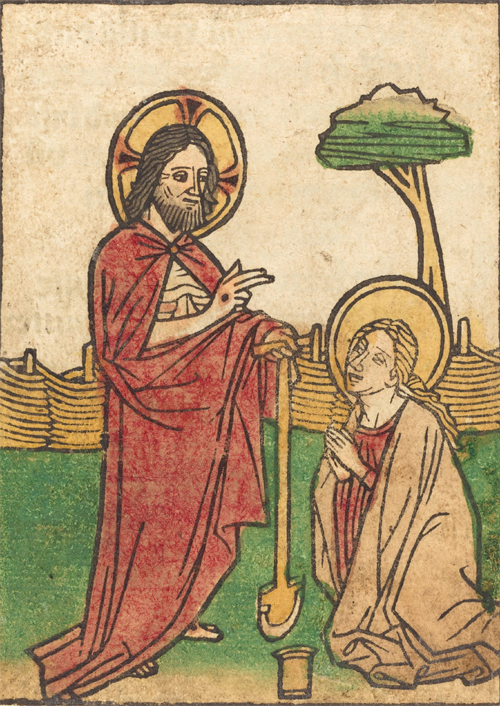Christian Art | Baptism | Our Christian Initiation | We Cross The Jordan
Office Of Readings | Week 10, Wednesday, Ordinary Time | A Reading From The Homilies Of Origen On The Book Of Joshua | The Crossing Of The Jordan
‘The crossing of the Jordan.’
The Crossing Of The Jordan
This remarkable homily from Origen, one of the most influential theologians of the early Church, invites the Christian to see biblical history not as distant or mythic, but as deeply personal and spiritually present. Drawing on the account of Israel’s miraculous crossing of the Jordan River in the book of Joshua, Origen constructs a rich allegory of Christian initiation, interpreting the Old Testament narrative as a prefiguration of the sacraments and the journey of the soul.
Historical And Theological Context
Origen of Alexandria (c. 185–254 AD) was a priest, theologian, and biblical scholar, known for his profound spiritual exegesis and for developing the early Church’s method of allegorical interpretation. Writing in a time when persecution and catechesis shaped the life of the Church, Origen saw in the Hebrew Scriptures not only historical events but signs and mysteries fulfilled in Christ and the Church.
The story of Joshua leading Israel across the Jordan (Joshua 3–4) marked the end of the Israelites’ desert wanderings and their entry into the Promised Land. For Origen, this moment symbolises not merely a national milestone but the believer’s transition from the old life of sin to the new life of grace, accomplished through baptism and discipleship.
Spiritual Interpretation Of Scripture | Baptism As The New Jordan
Origen interprets the Jordan crossing as a type (typos) of Christian baptism. Just as the Israelites crossed the waters under the leadership of Joshua (Hebrew: Yehoshua, the same name as Jesus in Greek), so the Christian passes through the waters of baptism under the Lordship of Jesus Christ. The priests halting the flow of the river so the people can cross safely prefigure the role of the Church’s ministers who preside at the font.
Baptism, then, is not only cleansing but an entry into a new spiritual country. Origen urges the hearer not to relegate the marvels of Scripture to the past but to see them fulfilled in their own life: ‘It is in you that they all find their spiritual fulfilment.’ The Red Sea symbolises liberation from sin; the desert symbolises catechesis and moral purification; and the Jordan signifies full incorporation into Christ through sacramental initiation.
Christ As The New Joshua
Moses, who represents the Law, cannot enter the Promised Land; he hands the people over to Joshua. Origen reads this as the Law giving way to the Gospel: the Old Covenant prepares, but only Christ can lead the soul into the fullness of divine life. Thus, just as Moses leads to the Jordan but does not cross it, so too the Law leads to Christ but cannot effect salvation without Him.
This transition from Moses to Jesus encapsulates the heart of Christian theology: grace surpasses the Law, and divine life is not earned but received through faith and the sacraments.
Contemporary Relevance | Jesus Christ Today
In an age where baptism is sometimes reduced to a cultural rite, Origen’s homily revives its theological depth and cosmic dimension. To be baptised is not merely to join the Church, but to pass from death to life, to renounce the Egypt of sin and begin a journey into the promised inheritance of heaven.
The vivid image of the waters halting in reverence before the ark of God challenges us to consider the sacredness of the Church’s sacramental life. Origen speaks not of past marvels but of present realities: God still divides the sea, still rolls back the Jordan, still leads His people with power and mercy.
For the newly baptised, this homily would have been a profound meditation on their own journey. For those long in the faith, it is a call to remember their first love, to see afresh the wonders of grace, and to walk anew in the land promised to those who persevere.
Reflection | Love Revealed By Jesus Christ
Origen ends with a poetic meditation on Psalm 114: ‘Why was it, sea, that you fled?’ The rhetorical question underlines the awe and majesty of God’s power. The sea and the river, the mountains and hills—all nature responds to the presence of the Lord. The Christian is called to that same response: to bow in reverence, to move in obedience, to be transformed by divine presence.
In the typology of Scripture, we find our own story. Egypt is our past. The desert is our purification. Jordan is our baptism. And the Promised Land is the life of grace now begun and destined for fulfilment in heaven. Christ is our Joshua. He goes before us, and with Him, the waters part.

A Reading From The Homilies Of Origen On The Book Of Joshua | The Crossing Of The Jordan
The ark of the covenant led the people of God across the Jordan. The priests and the Levites halted, and the waters, as though out of reverence to the ministers of God, stopped flowing. They piled up in a single mass, thus allowing the people of God to cross in safety. As a Christian, you should not be amazed to hear of these wonders performed for men of the past. The divine Word promises much greater and more lofty things to you who have passed through Jordan’s stream by the sacrament of baptism: he promises you a passage even through the sky. Listen to what Paul says concerning the just: We shall be caught up in the clouds to meet Christ in heaven, and so we shall always be with the Lord. There is absolutely nothing for the just man to fear; the whole of creation serves him. Listen to another promise that God makes him through the prophet: If you pass through fire, the flame shall not burn you, for I am the Lord your God. The just man is everywhere welcome, and everything renders him due service.
So you must not think that these events belong only to the past, and that you who now hear the account of them do not experience anything of the kind. It is in you that they all find their spiritual fulfilment. You have recently abandoned the darkness of idolatry, and you now desire to come and hear the divine law. This is your departure from Egypt. When you became a catechumen and began to obey the laws of the Church, you passed through the Red Sea; now at the various stops in the desert, you give time every day to hear the law of God and to see the face of Moses unveiled by the glory of God. But once you come to the baptismal font and, in the presence of the priests and deacons, are initiated into those sacred and august mysteries which only those know who should, then, through the ministry of the priests, you will cross the Jordan and enter the promised land. There Moses will hand you over to Jesus, and He himself will be your guide on your new journey.
Mindful, then, of all the mighty works of God, remembering that he divided the sea for you and held back the waters of the river, you will turn to them and say: Why was it, sea, that you fled? Jordan, why did you turn back? Mountains, why did you skip like rams, and you hills, like young sheep? And the word of the Lord will reply: The earth is shaken at the face of the Lord, at the face of the God of Jacob, who turns stones into a pool and rock into springs of water.

Prayer With Jesus
Lord Jesus Christ,
You are the true Joshua, who leads us across the waters of baptism into the land of promise.
Let us never forget the marvels You have done for us,
nor grow weary in the desert of daily life.
Teach us to read Your Word as our story,
to see Your hand in every moment,
and to follow You with courage and trust.
As You parted the waters for Your people of old,
so open a path for us through every trial,
until we meet You in the cloud and dwell with You forever.
Amen.
Glossary Of Christian Terms
- Typology: A method of biblical interpretation where events in the Old Testament are seen as prefigurations (types) of New Testament realities.
- Catechumen: A person undergoing instruction in the Christian faith prior to baptism.
- Sacramental life: The life of grace received through the sacraments, especially baptism, Eucharist, and confirmation.
- Theophany: A manifestation of God to humanity, often associated with power and natural phenomena.
- Psalm 114: A psalm recounting Israel’s exodus and praising God’s power over nature—used here allegorically to refer to baptismal grace.








